B2B marketing is getting tougher every day. You need to reach the right people, send personalized messages, and prove ROI, all while juggling limited time, budgets, and fast-changing tools. But there are AI marketing tools to help you. These platforms use artificial intelligence to handle business processes, from finding qualified leads to writing emails, tracking campaign performance, and even predicting which strategies will work best. Instead of spending hours on manual tasks, your team can focus on what really matters: strategy, storytelling, and building relationships. But with hundreds of AI-powered tools out there, it’s hard to tell which ones actually deliver results. In this article, you’ll discover what B2B AI marketing tools are and why they matter. Let’s dive in.
What Are B2B AI Marketing Tools?

B2B AI marketing tools are software platforms that use artificial intelligence to help businesses sell to other businesses. Unlike B2C tools, which focus on quick consumer purchases, these tools support longer sales cycles and involve multiple decision-makers.
Here’s what they can do:
- Find and qualify leads automatically
- Write marketing content
- Personalize messages at scale
- Predict buying intent
- Track performance and analyze data
- Automate repetitive tasks
- Record and summarize conversations
Think of these tools as smart digital assistants that learn from your data and get better with time. The more you use them, the more accurate and helpful they become.
Socialander helps B2B companies use AI tools the right way, combining technology with strategy to get measurable results.
Top B2B AI Marketing Tools You Can Use
Below are some of today’s most relevant AI tools that B2B teams use.
Content Creation & Writing Tools
1. Claude (Anthropic)

This is an advanced conversational AI designed to help with writing, research, and analysis. It can read and understand documents like PDFs, Word files, or spreadsheets, making it useful for marketers handling large amounts of information. Claude is known for being reliable and safety-focused, meaning it produces clearer and less “hallucinated” outputs compared to some other AI models. Its “Projects” feature allows teams to organize ongoing work, such as blog series or campaign content, within the same workspace. Claude integrates smoothly into workflows, helping teams brainstorm, write, summarize, and analyze data more efficiently.
2. Gemini (Google)

Google’s generative AI assistant that works inside Workspace tools such as Docs, Gmail, and Sheets. For marketers, it acts as a creative partner that helps you write and refine emails, blog posts, and reports faster. It’s multimodal, meaning it can work with both text and images, and can generate insights or summaries from data stored in Sheets or Google Analytics. Gemini makes it easy to create or edit content directly where teams already collaborate, reducing the need to switch between multiple tools.
3. Jasper AI

One of the most popular AI writing platforms built specifically for marketing teams. It helps you create high-quality blog posts, ad copy, social media captions, and emails using over 50 templates. Jasper’s standout feature is its ability to maintain your brand voice. You can train it to write in your preferred tone and style. It also integrates with tools like Surfer SEO, allowing you to optimize content for search engines as you write. Jasper is ideal for marketers and businesses that want consistent, high-performing content without spending hours drafting from scratch.
4. Copy.ai

Designed for fast, creative marketing copy. It helps you produce everything from email headlines to social media captions in seconds. The tool supports over 25 languages and lets you generate multiple variations of a message for A/B testing or experimentation. This makes it perfect for teams that want to speed up copy creation while still keeping content fresh and on-brand. Copy.ai is especially useful for smaller teams or startups that need to scale marketing efforts without hiring extra writers.
5. Writesonic

It combines AI content generation with built-in SEO features. You can create blog posts, product descriptions, ads, and landing page copy while also optimizing for search visibility. It includes a chatbot version called Chatsonic, which can pull real-time data from the web. It’s helpful for marketers who need up-to-date facts or trends. Writesonic’s interface is easy to use and ideal for both small businesses and large marketing teams that want to produce SEO-friendly content faster.
6. ChatGPT (OpenAI)

This is a general-purpose AI assistant that many marketing teams use daily. It’s great for brainstorming ideas, writing first drafts, summarizing content, or refining tone and structure. Because it can adapt to many different writing styles, it’s one of the most flexible tools for creative and strategic work. While ChatGPT isn’t built specifically for B2B marketing, it becomes powerful when you give it context such as your target audience, product details, and tone of voice.
7. Grammarly Business
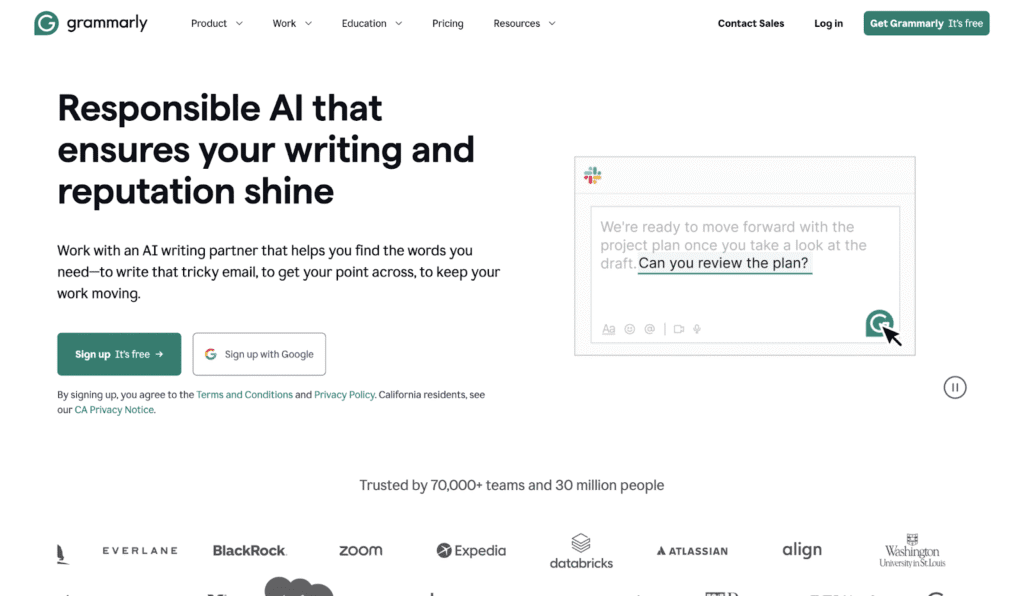
Grammarly Business focuses on improving the quality of what you write. It doesn’t create new content but enhances what you’ve written by checking grammar, tone, clarity, and readability. The Business version allows entire teams to share consistent writing guidelines and maintain a unified brand voice. It’s especially useful for marketing teams that produce a lot of client-facing content, as it ensures everything published is polished, professional, and easy to understand.
SEO / Content Optimization Tool
8. Surfer SEO

This tool helps marketers write content that ranks higher on Google. It analyzes top-performing pages for any keyword and provides specific recommendations on structure, headings, content length, and keyword placement. It’s used throughout the entire content process, from research and writing to optimization and auditing. Surfer also integrates with tools like Jasper and Google Docs, making it simple to apply its SEO insights directly within your writing workflow. As AI search and personalized results evolve, Surfer SEO positions itself as a tool that helps your content stay visible and competitive across search platforms.
Lead Generation & Prospecting Tools
9. Apollo.io

A comprehensive sales engagement and lead intelligence platform. It houses a large B2B database and offers features like email sequencing, call logging, task automation, and analytics. You can search for leads by filtering on firmographic data, then export or engage them directly. Its “Sales Engagement” module integrates email, calls, LinkedIn tasks, and workflow tracking into one system. Some users caution about data quality and bounce rates when sending bulk campaigns, so it’s wise to validate contacts before launching a big outreach.
10. Cognism
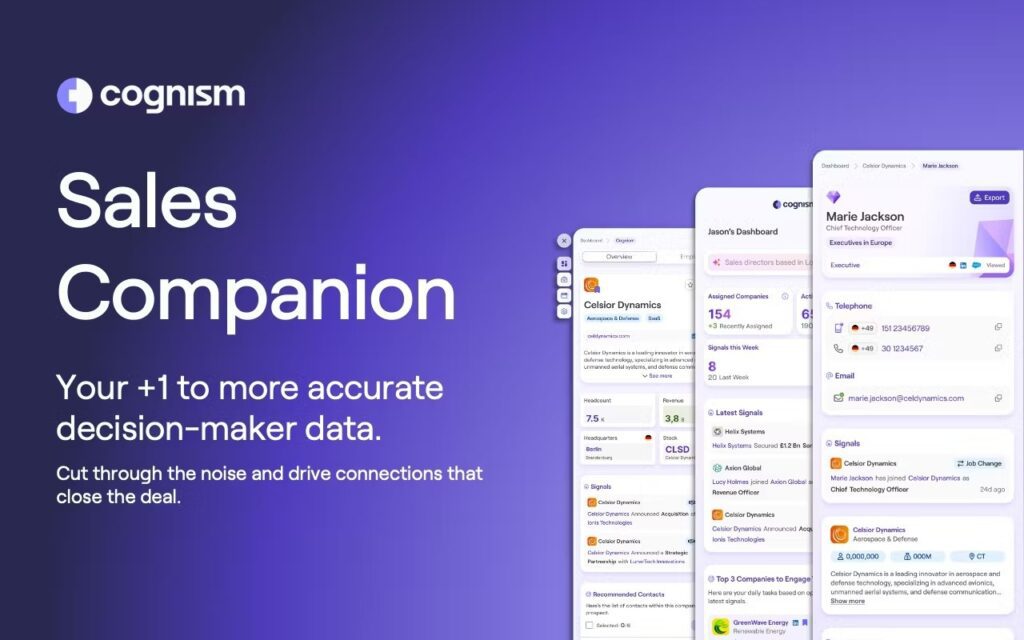
They position themselves as a sales intelligence and data platform with global reach. It provides phone-verified mobile numbers, business emails, and employs AI-driven “Sales Companion” tools to suggest new prospects and next best actions. It’s especially known for strong coverage in European and North American markets, making it a solid choice for B2B teams aiming to reach decision-makers across regions.
11. ZoomInfo

This is one of the more established B2B data providers, offering enriched account and contact intelligence. It includes intent data, signals that a company may be actively researching solutions, plus technographic and firmographic details. Because of its depth of data and tooling, it is often preferred by larger marketing and sales teams needing robust targeting and alignment across complex campaigns.
12. Clay

A data enrichment and management platform that aggregates data from dozens of sources to build clean, up-to-date contact records. Its strength lies in giving growth teams a unified view of prospects, automating data updates, and enabling personalized outreach at scale. Because it deals with many sources, it helps reduce stale or duplicate contact records, a common barrier in outreach workflows.
13. Seamless.ai
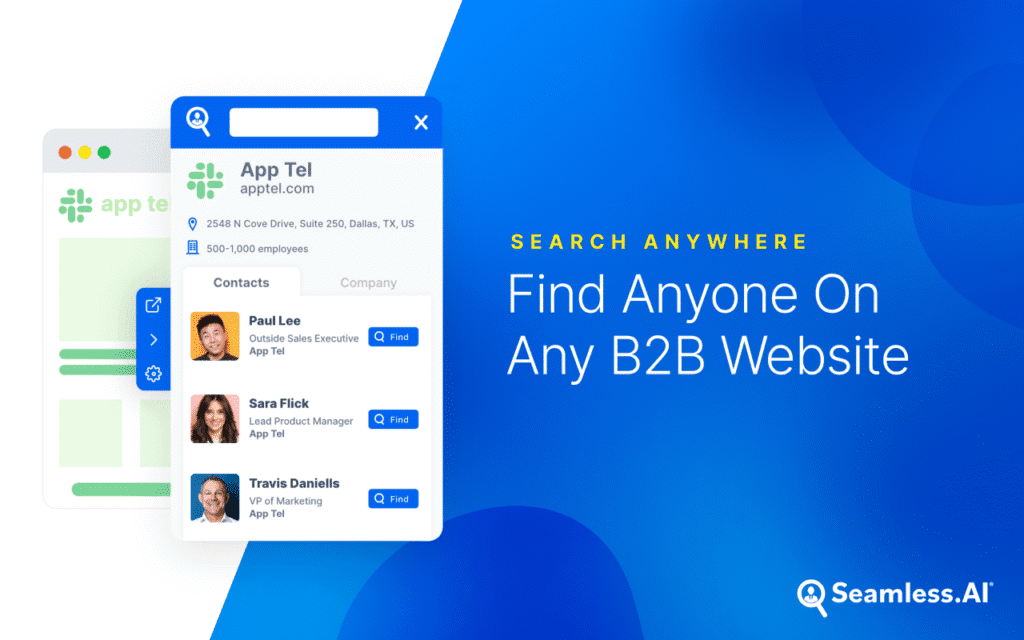
This is a real-time sales intelligence tool that helps you find and verify B2B contacts. It provides email addresses, phone numbers, and contact data, often used for outbound sales teams to build high-quality lists quickly. One of its selling points is the speed with which users can discover lead data without leaving their workflow.
Email / Outreach Tools
14. Lavender

This is an AI email “coach” for SDRs and account executives. While composing sales emails, Lavender scores your message, analyzing subject lines, tone, personalization, and structure, and gives real-time suggestions to improve your reply rate. It works in Gmail or other email clients, helping users write more effective emails without guesswork.
15. Instantly.ai
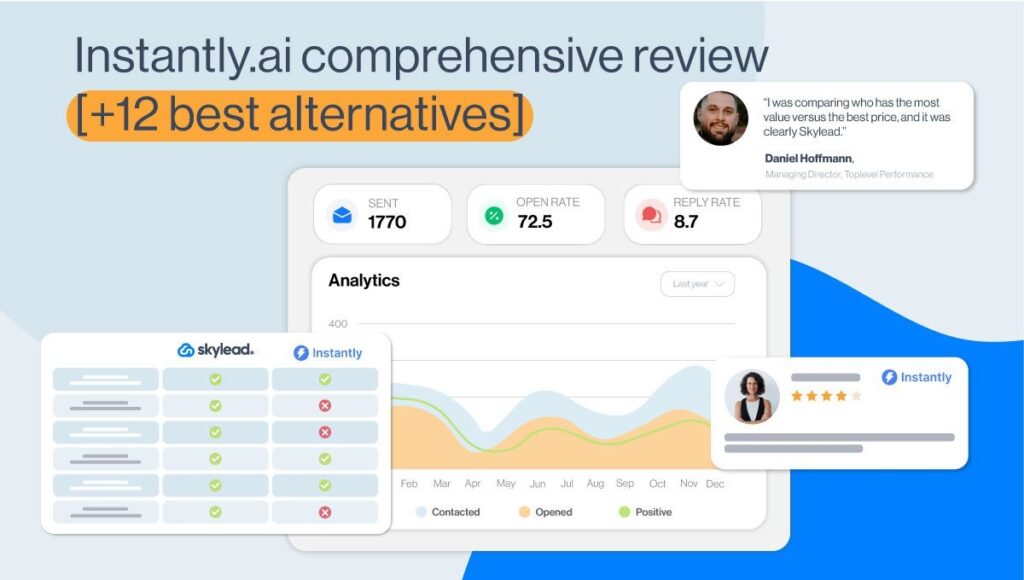
This is a cold email platform built for large-scale outreach campaigns. It supports email automation, warm-up sequences, personalization, campaign analytics, and integrates lead finding. Users note strong features for scaling outreach, but also mention that support and plan limits may be constraints for very large teams.
16. SmartWriter.ai

This is an AI-powered tool for cold email personalization. It researches target prospects (e.g., from LinkedIn, websites) and creates tailored opening lines or icebreakers that make outreach feel more human. This kind of personalization is especially useful in B2B outreach where first impressions matter. Because SmartWriter focuses on personalization rather than volume, it’s often used by teams wanting higher reply quality instead of mass sends.
Read also about AI personas and how they’re transforming B2B marketing
Marketing Automation / CRM
17. HubSpot (with AI / Breeze / Smart CRM)

HubSpot’s platform now includes AI-powered features that help marketers, salespeople, and support teams. Their “Breeze” suite features agents like the Prospecting Agent (finds leads and writes outreach), Personalization Agent (suggesting tailored content), and Data Agent (pulling insights from CRM data and external sources). Their Smart CRM uses AI to auto-enrich contact data, flag missing information, and surface insights across your team’s interactions. The goal is to reduce manual work and let your team focus on strategy and relationships.
18. Marketo Engage (Adobe)

This is a mature marketing automation tool tailored for B2B. It offers campaign management, lead nurturing, scoring, and integration with CRM systems. The “Engage” product includes personalization and account-based marketing features to tailor experiences for enterprises and complex sales cycles.
19. Salesforce Einstein

Einstein is the AI layer inside Salesforce’s CRM. It powers predictive lead scoring which leads are most likely to convert, opportunity recommendations, and automation of data entry tasks. Because it’s built into Salesforce, it works seamlessly with your sales workflows without needing separate tools.
Conversational AI / Chatbots
20. Drift

A conversational marketing platform that uses AI chatbots to qualify website visitors, schedule meetings, and route qualified leads to sales. The chat experience is built to feel natural, and Drift can integrate with calendars and CRMs so that chat and sales hand-off flow smoothly.
21. Intercom
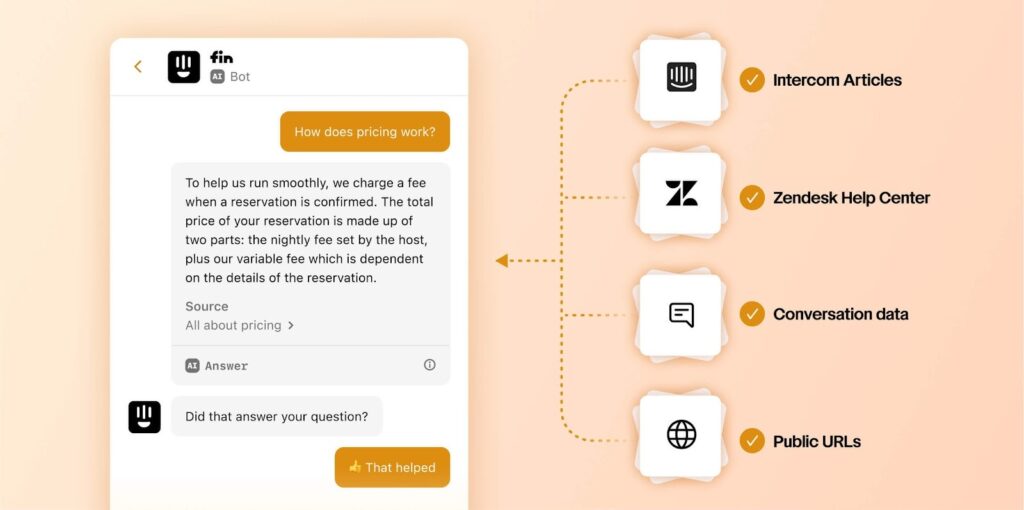
This is a messaging and support platform with a built-in AI chatbot called Fin. It handles visitor questions, captures leads, and passes them to sales or support based on context. It’s useful for marketing and customer support, not just one or the other.
Meeting / Conversation Intelligence
22. Fireflies.ai

This is an AI meeting assistant that records audio from video calls like Meet, Zoom, Teams, etc., transcribes the conversation, and summarizes key points, tasks, and action items. It integrates with CRMs so that insights from your calls are attached to contact or deal records automatically.
23. Otter.ai

It provides real-time transcription for meetings, interviews, or calls. It also highlights important points, lets you search inside transcripts, and makes meeting notes useful immediately. It’s often used by content teams, sales, or anyone who needs accurate notes from calls.
Analytics & ABM / Optimization
24. 6sense
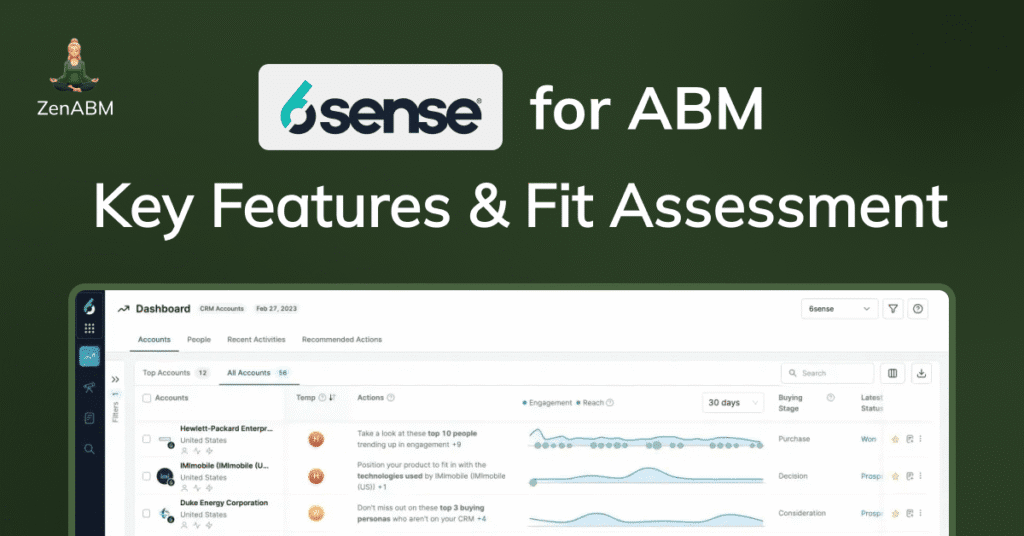
This is a predictive analytics and ABM platform that looks at signals (behaviour, intent, firmographics) to identify accounts likely to buy. It helps marketers see where accounts are in their buying journey and prioritize outreach accordingly. It integrates with CRMs and marketing systems to turn those insights into actions.
25. Demandbase
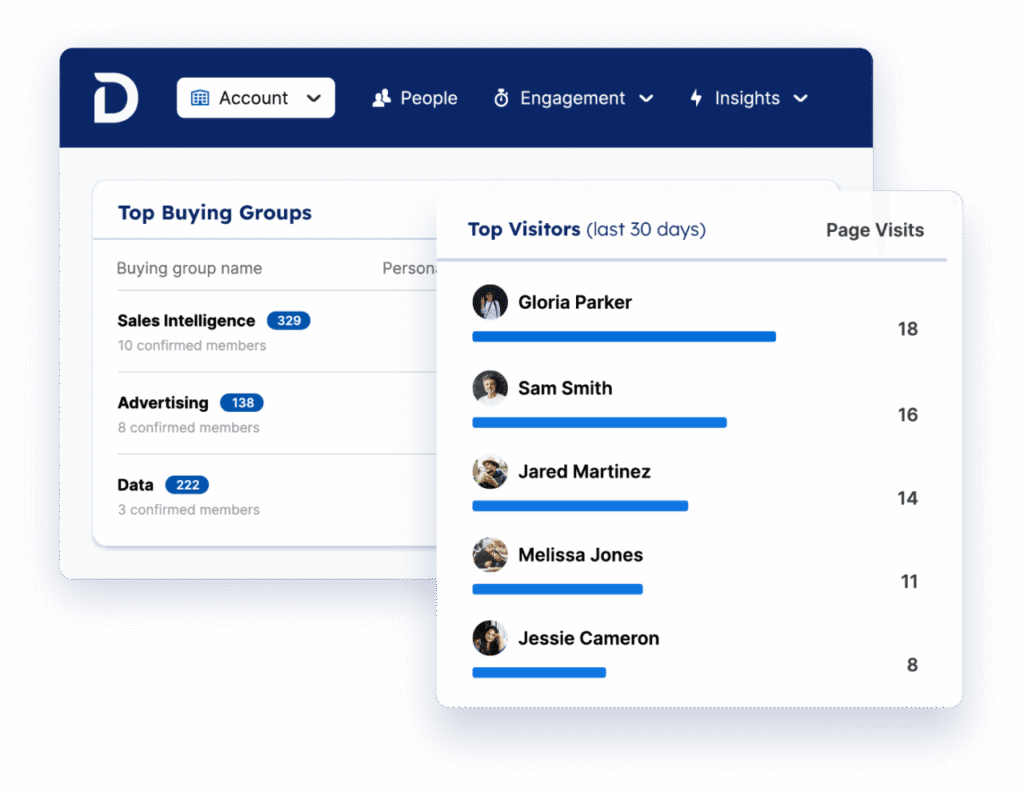
An ABM suite that includes account intelligence, advertising, engagement, and measurement tools. It helps B2B marketers find target accounts, engage them across channels, and measure impact.
Read also about digital marketing tools that help grow your business.
Key Features to Look For in B2B AI Marketing Tools
Not every AI marketing tool will fit your team’s needs; the best ones are those that make your work easier, smarter, and more efficient. Here’s what to look out for when choosing:
1. Easy integration
Your AI tool should connect smoothly with your existing systems: CRM, email platform, analytics tools, or ad accounts. Before investing, check its integration options to avoid workflow breaks or manual data transfers.
2. Lead scoring and qualification
A good AI tool should help you focus on the right prospects. Look for platforms that automatically analyze engagement levels, firmographic data, and buying intent to show which leads are most likely to convert.
3. Content generation
Many B2B AI tools can now assist with writing, from emails and ad copy to blog posts and social updates. The best ones learn your brand’s tone, ensuring every piece of content sounds consistent and on-brand.
4. Personalization at scale
AI should make it possible to tailor messages for hundreds or even thousands of prospects automatically. This ensures each recipient gets relevant communication without your team spending hours customizing messages.
5. Data accuracy
AI is only as smart as the data it’s trained on. Choose tools that use verified, regularly updated data sources to ensure your targeting, lead scoring, and reports remain reliable.
6. Analytics and reporting
Opt for platforms with clear dashboards that help you understand what’s working and where to adjust. Strong visualization and reporting save time and guide better decision-making.
7. Conversation intelligence
If your team relies on calls or meetings, prioritize tools with accurate transcription, CRM syncing, and AI-generated insights from discussions. These features help turn conversations into actionable data.
8. User-friendly interface
The best AI tools don’t need a manual. Look for software your team can start using right away, intuitive, simple, and built for productivity, not complexity.
How to Choose the Right Tool for Your Business
With so many AI marketing tools available, it’s easy to feel overwhelmed or make a rushed choice. The key is to choose based on your actual business needs, not just trends or fancy features. Here’s a simple process to help you pick the right one:
1. Identify your biggest pain point
Start by defining what you need the tool to solve. Are you struggling to find quality leads, create content faster, or improve email deliverability? Pinpointing your top challenge helps you choose a tool that delivers immediate impact instead of adding more noise.
2. Consider your budget
AI tools vary widely in price, depending on features and team size. Check for hidden costs like add-ons, user seats, or data limits before committing.
3. Check your team size and capacity
Some tools are built for small marketing teams; others require dedicated admins or technical support. Match the tool’s complexity to your team’s size and technical ability so it doesn’t become underused or overwhelming.
4. Verify integration compatibility
Your new AI tool should work well with your existing CRM, email marketing platform, and analytics tools. Poor integration can lead to broken workflows and wasted effort, so confirm compatibility early.
5. Read real user reviews
Don’t rely solely on what the company says. Check review platforms on Google to see how real users rate the tool for reliability, customer support, and results.
6. Take advantage of free trials
Most tools offer free trials, usually 7 to 14 days. Use that time to test the tool on real tasks, not just demos. This helps you see if it truly fits your team’s workflow and goals.
7. Start small and scale up
Avoid buying multiple tools at once. Begin with one that solves your most urgent need, master it, and measure results. Once you’re confident it’s driving impact, you can expand your stack strategically.
Conclusion
AI marketing tools are a must-have for B2B companies that want to stay competitive. These tools help you find and nurture better leads, create content faster, personalize communication at scale, and uncover insights that drive smarter decisions, all while saving time and reducing costs.
The B2B brands leading today aren’t just doing more; they’re doing it smarter with AI. Your competitors are already using these tools to move faster, close deals sooner, and connect better. The real question isn’t if you should use AI marketing tools; it’s which one you’ll start with first. Let Socialander help you find and integrate the right AI solutions for your business. Book a free consultation today!





